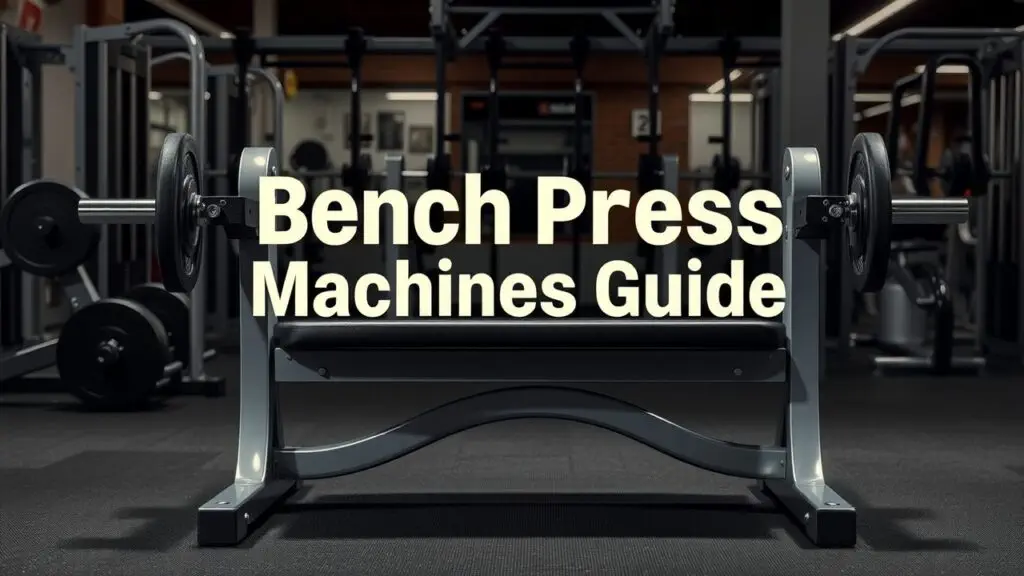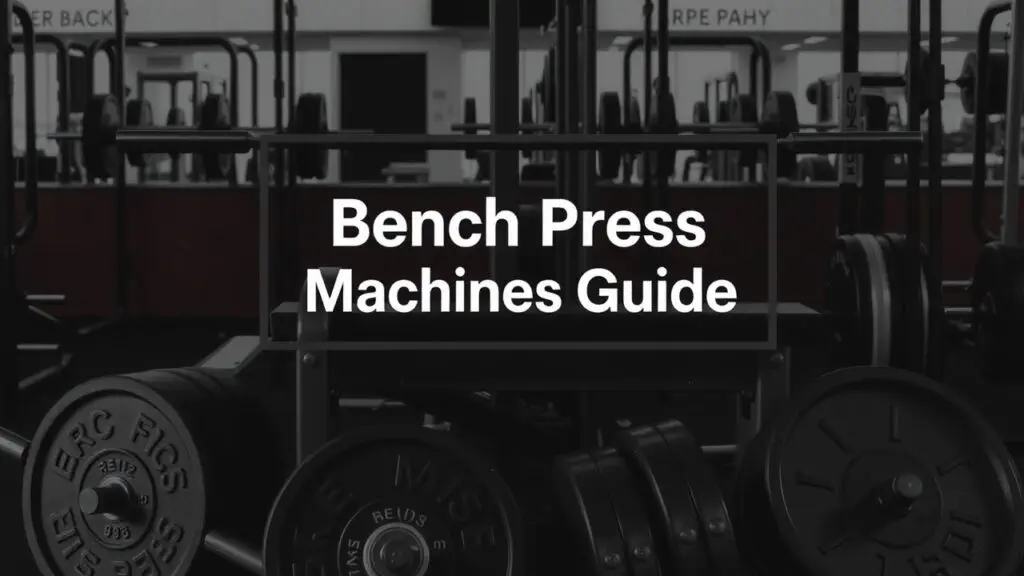Different types of bench press machines offer varied chest workouts. This guide details each machine, muscle activation, and exercise variation for a complete chest workout.
What Are Bench Press Machines?

Bench press machines are special tools for strength training. They help you lift weights safely and focus on your chest, shoulders, and triceps. These machines provide a steady spot to work out, making them good for everyone from beginners to pros.
You can find different types of bench press machines. Some have adjustable angles. This means you can do flat, incline, or decline presses. This helps target more muscles during your workout.
Using bench press machines has many benefits. They keep you safe because they guide your movements. This makes it less likely you’ll get hurt compared to using free weights. They also give you steady resistance throughout the lift. This helps you focus on your form and technique.
Why Choose the Right Bench Press Machine?
Picking the right bench press machine is key for reaching your fitness goals. Whether you’re looking to build strength, grow muscle size, or recover from an injury, the best bench press machine fits your needs.
Here are some reasons why the right choice matters:
- Muscle Activation: Different benches work muscles in unique ways.
- Biomechanics: Good machines support how your body naturally moves.
- Comfort: Proper padding and adjustable parts make workouts easier.
- Safety Features: Many machines have built-in safety features to keep you safe while lifting heavy.
- Injury Prevention: The right machine helps protect your joints while still being effective.
Thinking about these points when choosing a bench press machine can help improve your workouts and keep your joints healthy while doing chest workouts.
Types of Bench Press Machines Explained
Flat Bench Press Machine (Standard Free Weights)
The flat bench press machine is super common in gyms and home workout spaces. It lets people do the classic barbell bench press or dumbbell bench press. This targets your chest, shoulders, and triceps really well. Usually, this machine has a strong frame and a comfy padded bench to support you while lifting weights.
Key Features:
- Versatility: You can do various exercises like barbell bench presses and dumbbell presses.
- Adjustability: Many have adjustable height settings, so they work for different body types.
- Compact Design: Some smaller versions fit well in tight spaces at home.
Pros:
- Great for building upper body strength.
- Simple design makes it easy for beginners to use.
Cons:
- You need free weights, which could cost more if you don’t already own them.
Incline Bench Press Machine
Incline bench press machines are all about developing the upper part of your chest. When you tilt the bench up, it changes how your muscles work during workouts. This is a good choice if you want to boost your upper body strength even more.
Key Features:
- Targeted Muscle Engagement: Focuses on your upper pectoral muscles along with shoulders and triceps.
- Sturdy Construction: Made to safely support heavier lifts.
Pros:
- Good for fixing muscle imbalances by working on weaker areas.
Cons:
- Some users find it less comfortable than flat benches due to its angle.
Decline Bench Press Machine
The decline bench press machine helps you strengthen lower pecs. With this setup, one end of the bench is lowered so you lie back at an angle facing down. It’s great for getting balanced muscle growth across your chest.
Key Features:
- Lower Pec Emphasis: Specifically works on lower pectorals and engages supporting muscles like triceps and shoulders.
Pros:
- Effective at addressing muscle imbalances in different areas of your chest.
Cons:
- These machines aren’t as common in gyms, so you might need to order one for your home gym setup.
Understanding these types of bench press machines can help fitness lovers pick the right equipment for their training goals. Whether you’re looking to build overall strength with flat benches or focus on specific muscle groups with incline or decline setups, there’s something out there for everyone!
Smith Machine for Chest Workouts
Smith Machine vs Standard Free Weight Comparison
The smith machine bench press is a great option for many people. It’s especially helpful for beginners. It has a guided vertical barbell track system that helps with balance. This makes it easier to keep the proper bench press technique while lifting weights.
On the other hand, free weight bench presses are different. They let you move more freely, which can help build stabilizing muscles. But, they might feel scary for newbies because you need good form and safety knowledge. Guided weight machines like the smith machine make learning simpler and still help you get stronger.
| Feature | Smith Machine Bench Press | Free Weight Bench Press |
|---|---|---|
| Stability | High | Low |
| Range of Motion | Limited | Full |
| Safety | Built-in supports | Requires spotter |
| Learning Curve | Easier | More challenging |
Features
Smith machines come packed with useful features. The guided vertical barbell track system keeps the bar moving straight, making it easier to control. Many models also have adjustable weight machines, which let you change how heavy the weights are quickly.
Safety is another big plus with a smith machine. Most have safety catches or hooks that stop weights from falling if something goes wrong. This feature is super helpful for beginner bench press machines since it lowers the risk of getting hurt when lifting heavier weights.
Benefits
There are plenty of benefits to using a smith machine. First, it offers enhanced stability and controlled movements. This helps you focus on building muscle without stressing over balancing free weights. It’s also good for folks who are recovering from injuries or taking a break from working out.
Since these machines guide your movements, they provide great support for chest workouts like incline or decline presses. This versatility makes them excellent strength training equipment for both home gym setups and commercial gyms.
Space Requirements & Use Cases
When it comes to space, most smith machines need moderate space compared to other bench press types, but this can vary by design and extra attachments like benches or racks. If you’re setting up a home gym and space is tight, be sure to measure your area before buying one.
In commercial gyms, having several smith machines can help accommodate different workout routines at once without using too much floor space.
Hammer Strength Bench Press Machine
Description
The hammer strength bench press machine stands out due to its independent movement arms. These arms allow for natural movement patterns while lifting weights. Many models come with adjustable weight benches too, making them fit for various users.
Benefits
Using this machine has some real benefits. It helps with targeted muscle activation, meaning you can focus on specific areas of your chest during workouts. Plus, it reduces joint stress by providing support in all the right places while lifting.
You get biomechanically sound exercises as well! This means you’re more likely to lift safely and efficiently without overstraining your body.
Drawbacks
While there are many pros, there are a few drawbacks too. Hammer strength machines often cost more than other types of bench press machines. Some users find that the complex setup might need some tweaking to get right.
Best For
This machine is perfect for advanced lifters seeking targeted muscle activation. It fits well in bodybuilding equipment collections where serious gains are a priority!
Choosing Your Bench Press Machine: A Buyer’s Guide

Fitness Level: (Beginner, intermediate, advanced)
When you pick a bench press machine, your fitness level matters a lot. If you’re a beginner, an adjustable flat bench is a great start. It lets you do different exercises and helps you learn good form without too much stress. For those who are at an intermediate level, incline or decline benches can help work different muscle groups more efficiently. Advanced lifters may want specialized machines like the Smith machine or a power rack because they offer more stability and safety for heavy lifts.
Training Goals: (Strength, hypertrophy, rehabilitation)
Your training goals also guide your choice of bench press machine. If you’re aiming for strength building, look for machines that can hold heavier weights and give you support during lifts—like a power rack with safety bars. For muscle building using hypertrophy training programs, an adjustable incline/decline bench can target specific areas of your chest and shoulders. If you’re recovering from an injury, choose machines that focus on injury prevention; these often have padded supports and smart designs.
Budget: (Price range options for different machines)
Budget plays a big role in deciding on a bench press machine. Prices can vary quite a bit based on features and quality:
- Flat Bench: $100 – $300
- Incline/Decline Bench: $150 – $400
- Smith Machine: $300 – $1,000
- Power Rack: $400 – $1,500
There are affordable choices that still work well. But spending a bit more on high-quality gear might give you better durability and performance over time.
Space Considerations: (Dimensions and space requirements for each machine type)
Before buying any bench press machine, check how much space you have in your home gym or commercial setup. Compact models are perfect for smaller areas but make sure they fit your workout needs:
- Flat Benches usually need about 4 feet by 2 feet.
- Incline/Decline Benches require similar space but might be longer when adjusted.
- Smith Machines take up around 6 feet by 4 feet.
- Power Racks need even more room—about 7 feet by 5 feet.
Always leave enough space around each piece so you can work out safely.
Joint Health: (Considerations for individuals with pre-existing conditions)
Think about joint health when picking a bench press machine. Proper technique is key to getting good workouts and avoiding injuries while lifting weights:
- Look for benches with enough padding to lessen stress on joints.
- Choose adjustable settings so users can find positions that feel comfortable.
If you have past issues like shoulder pain or back problems, talk to a healthcare expert before starting any new weightlifting routine to make sure you’re being safe while working out.
Mastering Bench Press Technique and Safety
Proper Form for Each Machine Type
Using different bench press machines means you need to keep good form. This helps you get stronger and stay safe.
- Flat Bench Press Machine: Sit back flat against the pad. Keep your feet on the floor. Grip the bar just wider than your shoulders. Lower the weight slowly until it touches your chest, then push it back up. Keep your elbows at about a 45-degree angle.
- Incline Bench Press Machine: Adjust the seat so that when you sit, your arms are level with the floor and at a 30-45 degree angle from your body. Feet should stay flat on the ground. Grip the handles outside shoulder width. Lower the weight towards your upper chest, then press it back up.
- Decline Bench Press Machine: Strap yourself in if possible, since this position can feel wobbly. Lie back with shoulders on the pad and feet secured under foot pads or resting flat below you. Lower the weights toward mid-chest and then push them up.
- Smith Machine Bench Press: Sit like in a flat bench press but align yourself under the barbell track of this machine. It moves straight up and down, which helps keep control during lifts.
- Hammer Strength Machines: These machines let each arm move separately, like lifting free weights but with support. Adjust seats so grips are around shoulder height—lower weights smoothly without locking out elbows fully at the top to keep joints healthy.
Warming Up Before Bench Pressing
Warming up is super important before lifting heavy weights like when bench pressing. It helps prepare your muscles and lowers injury risks.
Start with light cardio like jogging in place or jumping jacks for five minutes to raise your heart rate and warm up muscle groups used in pressing (chest, shoulders). Then, do some dynamic stretches:
- Arm Circles: Hold arms out parallel to your shoulders; make small circles getting bigger.
- Shoulder Rolls: Lift shoulders to ears and roll them backward, then forward.
- Chest Openers: Stand tall; clasp hands behind your back and gently pull upwards to stretch pectoral muscles.
Also, do warm-up sets using lighter weights on the bench press machine you plan to use later—try two sets of 10 reps focusing on good form!
Safety Guidelines and Precautions
Safety first! Here are some important rules to follow while using bench press machines:
- Check equipment before using it to make sure everything works fine.
- Pick weights that match your strength—don’t try heavy lifts without enough practice!
- Always have a spotter when doing heavy lifts, especially if you’re going for personal records—they can help if something goes wrong!
- Learn about emergency release mechanisms usually found near gym equipment so you can quickly disengage if needed.
- Keep a clear space around benches to avoid tripping or other accidents while lifting!
Common Mistakes to Avoid
Avoid these common mistakes when using bench press machines:
- Lifting too much weight too soon can lead to bad form and injuries over time.
- Not engaging core muscles enough may cause instability during lifts.
- Rushing through repetitions without controlling speed can make you lose control and hurt yourself.
By knowing these mistakes and practicing correct techniques, anyone can work out safely while getting stronger!
Frequently Asked Questions (FAQs)
What is the difference between an Olympic bench press and a standard bench press?
An Olympic bench press uses a longer, heavier barbell. The Olympic bar weighs 45 pounds and is 7.2 feet long. A standard bench press often uses a lighter, shorter bar. This can impact your workout routine and muscle engagement.
How do machine weight benches compare to free weight benches?
Machine weight benches offer stability and support. They guide your movement for safer lifts. Free weight benches allow for greater range of motion. They engage more stabilizing muscles but require good form.
What are the benefits of using a resistance bench press machine?
Resistance bench press machines provide controlled movement. They minimize the risk of injury while focusing on form. These machines help beginners learn proper technique, which supports muscle building.
Can I perform shoulder and triceps workouts on bench press machines?
Yes, many bench press machines allow for versatile workouts. You can adjust angles to target shoulders and triceps effectively. Adding different grips also helps work these muscle groups during your routine.
What should I look for in a high-quality bench press machine?
Look for durable construction, padded rollers, and adjustable thigh pads. Ensure it has safety features like non-slip grips and sturdy weight capacity. Warranty options also reflect product quality and reliability.
How much space does a compact bench press machine require?
A compact bench press machine typically needs less floor space than larger models. Expect to clear around 4 feet by 2 feet for optimal use at home or in a gym setup.
What are the differences between plate-loaded and selectorized machines?
Plate-loaded machines use traditional weights added to a bar or lever. Selectorized machines have integrated weight stacks you select with a pin. Plate-loaded offers more customization while selectorized is quicker to adjust.
Bench Press Machine Overview
- Pectoral Exercises: Key movements that enhance chest strength.
- Adjustable Weight: Allows users to change resistance easily.
- Weight Capacity: Ensure the machine can support heavy lifting.
- Durable Bench Press Machine: Invest in equipment that lasts.
- Safety Features: Look for catch bars or hooks for added protection.
- Home Gym Setup: Choose machines that fit small spaces efficiently.
- Affordable Bench Press Machines: Quality doesn’t always mean high price.
- Commercial Gym Bench Press: Heavy-duty models designed for frequent use.
- Fitness Goals: Define whether you want strength or hypertrophy.
- Workout Plans: Incorporate various presses into your weekly routines.
Related Topics
- Types of Bench Press Exercises
- Types of Weight Machines
- Types of Strength Training Equipment
- Types of Gym Equipment
- Types of Home Gym Equipment
- Types of Fitness Equipment
- Types of Weightlifting Machines



Types of Bench Press Machines: A Complete Guide to Chest Workouts